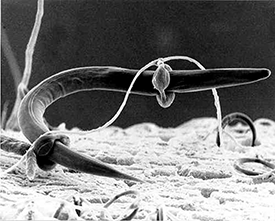
Nematodes or roundworms are almost microscopic worms – the majority of them can be beneficial as they help break down organic matter and control pests such as insects. However there is one group of nematodes which are real troublemakers – they attack and feed on the roots of plants, and if their numbers explode, the damage to a plant’s roots can kill young plants and stress older plants so they become prone to diseases.
So how can we control these damaging nematodes?
There are chemical solutions to fumigate your soil – unfortunately many of these are very toxic and will kill other soil inhabitants. The other method which can be effective is solarisation – in essence you dig over the soil and cover it in black plastic and then let the heat of the sun cook the soil. Again you kill nearly everything else in the soil, and it only works in hot conditions in the middle of summer.
There is a biological solution however, and that is with nematode-eating fungi. There are about 300 different fungi that essentially feast on nematodes. Some destroy the nematode eggs, and others grow into the mouth of nematodes and digest them from the inside out, but the most interesting fungi are those that trap nematodes using sticky pads or lassos. Once the nematodes are stuck, they are digested by the fungi.
So why do the fungi do this, and how do you encourage them in your soil?
For the fungi, the nematode represent a meal of protein in the form of nitrogen. So when you use very high nitrogen-based fertilisers (especially some of the chemical fertilisers), the fungi actually switch off the nematode-killing system, because they are getting all the nitrogen they need for free. So using these types of fertilisers can actually make your nematode problem worse.
It has been discovered that low levels of slower-released nitrogen provided by products such as Seamungus, Whoflungdung and even Gyganic actually stimulates the fungi to produce these nematode traps, and therefore helps to control them. Obviously adding organic matter to your soil and encouraging a diversity of microbes ensures that these nematode-eating fungi are present in the first place. So not only can these products help control nematodes in an environmentally friendly way, they also feed your soil and plants at the same time.
